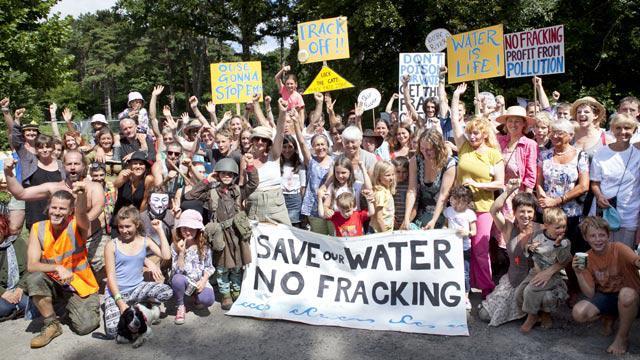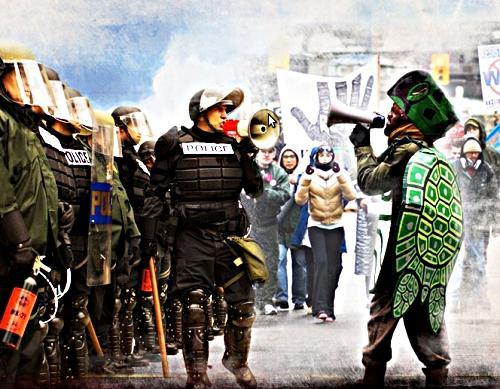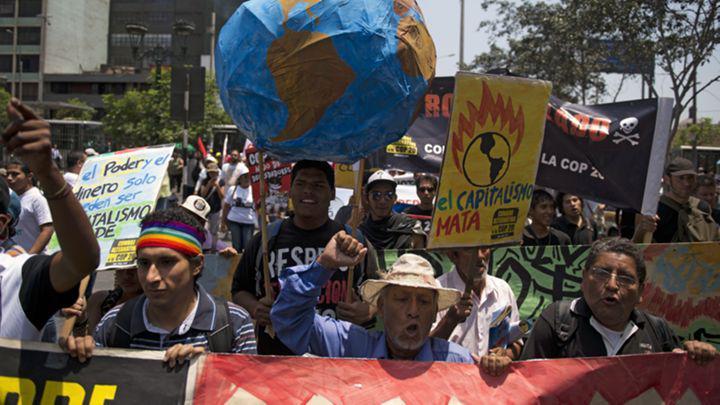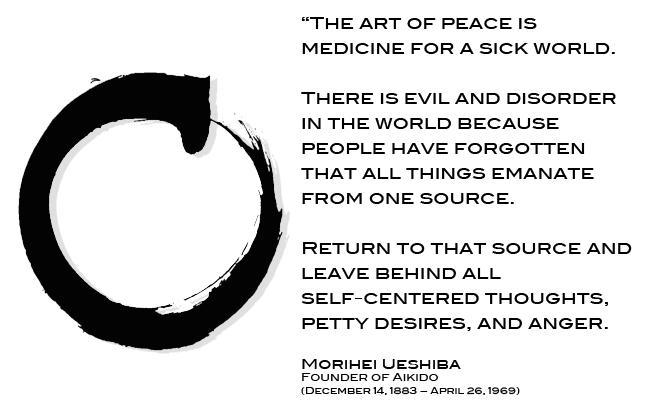
By the Barefoot Doctor
The question is often put to me: whether it's right we fight or not for causes we passionately believe in and care about. If someone who cares with a sense of urgency about the exponentially burgeoning extinction of all life on Earth, and is impelled to act, is it right to fight the perceived perpetrators: oil companies, shipping companies (shipping is one of the main contributors to global warming), globalized corporations, governments? Is doing nothing at all merely a cowardly abnegation of responsibility and tantamount to being an actual perpetrator? And if not to fight, then what – is there any other way to make change?
!protestAs a martial artist with 50 years daily practice under my belt, so to speak, I've observed better long term results are usually attained through cooperative rather than confrontational dialogue, so I tend to be slightly biased in that direction.
SUPPORTED BY HEROES LIKE YOU
Support independent eco journalism that drives real change.Gandhi who uttered the now hackneyed yet succinctly brilliant axiom, “be the change you want to see”, was committed to a non-combative approach. And you may think that soft of him, but it worked. India won its independence relatively painlessly to the extent they and the British who'd robbed and maltreated them for 300 years or so, were able to maintain a friendly dialogue all the while and have done more or less ever since. It took some time to pull off and he was tragically assassinated before he'd had the satisfaction of knowing his radical way had won the day, but if you consider the time and bloodshed it would have required had they gone the combative route, Gandhi's approach was exponentially more economical.
And with respect to being the change you want to see, if you can be an exemplar of the peaceable, sensible, collectivistically-minded brother or sister of the people kind of person you'd like to see running the global show, and if you, using your Jedi powers, are able to infiltrate (benignly) the corridors of temporal power as that exemplar, you stand to gain faster and greater advantage by inspiring the relevant people to evolve a healthier stance, than you might by adopting the contentious combative approach. What you resist tends to resist you equally.
What you fight tends to fight you back.
There's no right or wrong about it, however. Sometimes it might be right to fight – it might be the only way. But only as a last resort when all more sensible forms of negotiation have failed.
Sometimes it might be right to make a huge noise in order to attract the right sort of attention. Sometimes it might be better to keep the conversation among the actual players and decision-makers involved.
Using only ten percent of the amount of time, energy and resources it takes to marshal thousands of people to demonstrate and make a noise, and applying it to some beelining action, you're likely to have gained direct access to the ears and heart of the very people who make all the decisions. That's certainly the most direct, least potentially messy or disruptive way. But on the other hand, having made sufficient noise and built up a sufficient groundswell of public support for your cause whereby leaving the issue unaddressed would then be a potential vote-looser, political parties and governments are going to take the issue a lot more seriously. The US Republican Party, who even now are reformulating their environmental policies for the 2016 elections for this very reason are a case in point.
There are different temperaments and different phases of life so no fixed tendency can be ascribed to any individual: some shine best when making a noise and disrupting the status quo to trigger change, some are more effective making a beeline for the actual people who make the decisions, and some are most effective at triggering change from the metaphysical level, through meditation practice.
The point is we are a collective organism – a vast team – variously pulling together and pulling apart as any organism does, (because everything and everyone in the realm of matter is subject to a fierce yin and yang push and pull dynamic). But generally over the long term, most teams no matter how large or unruly, tend to pull together more effectively through negotiation than by brute force.
There's also the element of us taking responsibility for each our parts in the ecological situation, rather than blaming various social factions, on an us against them basis. We each are responsible. We each take advantage and benefit to some extent from the extra ease afforded our lifestyles by our complex system of globalization. We each benefit by the transportation and delivery systems, even if we only ride a bike (bicycles are produced, distributed and delivered through the global system, and as such are as much part of the problem as part of the remedy, for instance).
We each use and benefit to some extent by the mobile networks, the internet, the banking system, the electricity that runs it all, and so on.
Approaching those who make the decisions as a potential collaborator in our world's healing, might have a far more efficacious and fast-acting result in terms of influencing them to radically rethink their stance, than approaching them as an antagonist or as part of an organized multitude of antagonists.
But this requires an ability and willingness to empathize. If, Shakespeare-like you view the human world as a play, and all of us here actors on its stage, it's clear for the sake of dramaturgic dynamics there's a need for baddies as well as goodies. When seen as a collective enterprise it's clear the baddies (those on whom you'd otherwise be inclined to place blame for our predicament) are playing that unsavory, soul-damaging role so you don't have to.
So be grateful to them for that. Then if you overcome all prejudice and put yourself in their shoes, and contemplate the manifold pressures they face (pleasing stockholders, boards of governors, beating the competition, and so on), it inclines you more to seeing the task at hand as a potentially collaborative, collective one in which together we seek a new stage of collective evolution, rather than an us-and-them scenario, in which we seek transformation through the bloodshed, disruption and destruction that inevitably arises from taking the revolutionary stance to its conclusion, however romantically enticing that option might initially appear.
As I say this isn't in any way to suggest Gandhi's way of non-confrontation is ultimately right or superior to the way of the militant activist, or vice versa. We each have our own style, calling, and mode and must do our best to stay true to it.
[caption id="attachment7308" align="alignleft" width="276"][](https://cdn.ecohustler.com/media/2019/03/19/barefoot-doctor-004001_opt.jpg) Barefoot Doctor is action[/caption]
But in being the change you might wish to see, it begins with the exemplifying the principles you might wish to see others live by: presumably decency, respect for all life, considerateness, thoughtfulness, empathy, honorability, integrity, kindness and a firm acceptance of responsibility for the world we bequeath to future generations (assuming we do actually succeed in preventing our own relatively immanent extinction).
And I suggest this could take pride of place in terms of what you choose most to focus on. With that in place, whether your way is then to fight or throw light, you'll succeed far more easily and effectively - and enjoyably -(because if you're not enjoying the play, what's the point of being in it).
***
Sign up for the Barefoot Doctor's online [Superhealing training](http://www.barefootdoctorglobal.com/healing/)




